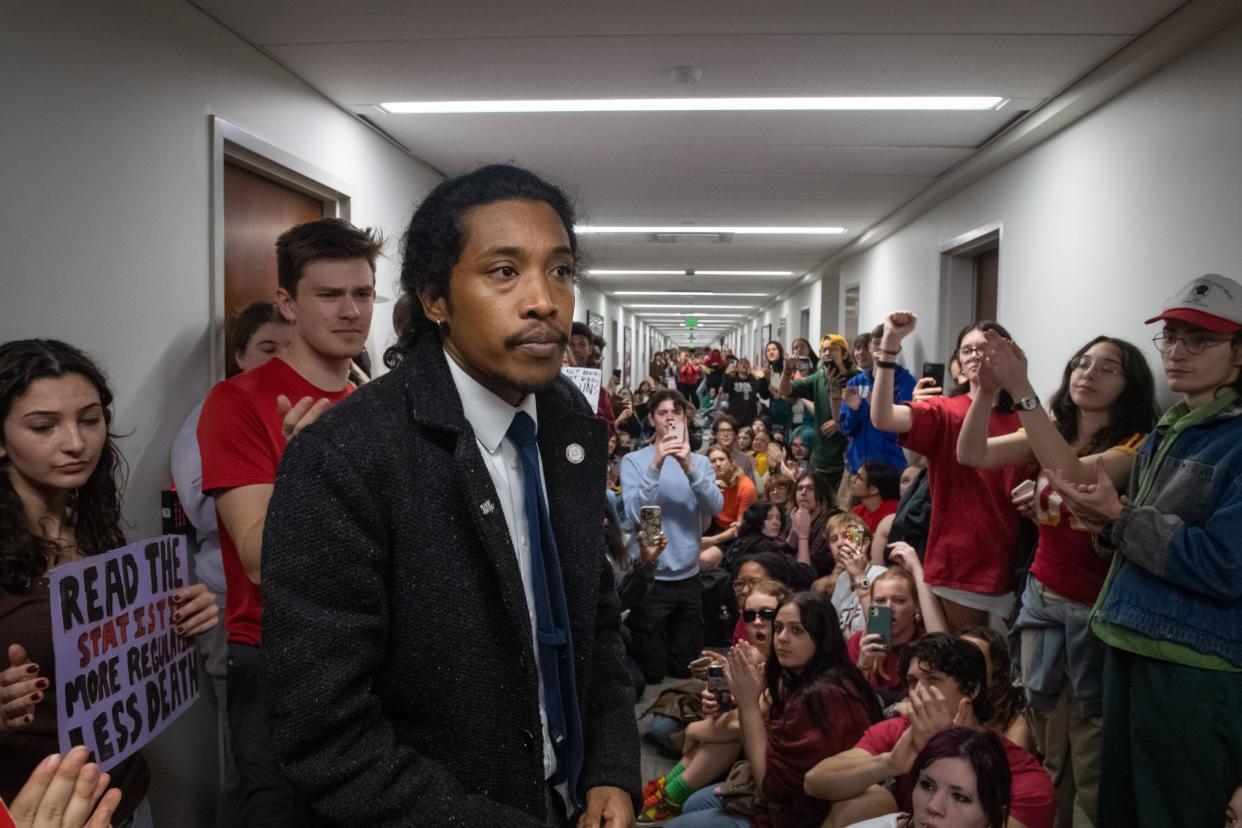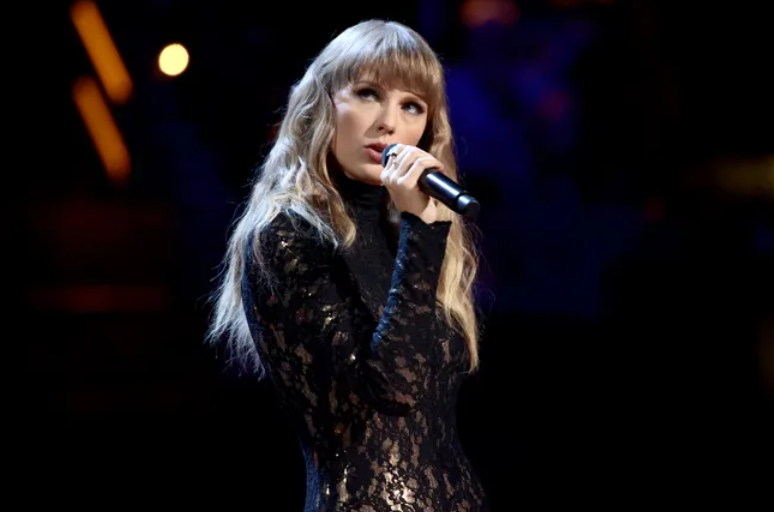Taylor Swift, deep fakes, free speech and the push in Tennessee to regulate AI
Two Tennessee representatives have proposed bills to expand the penalties and limitations of artificial intelligence in light of the viral AI images of Taylor Swift that rocked the internet in late January.
Sexually explicit images, created by generative AI users and depicting Taylor Swift, were viewed millions of times on X on Jan. 24, forcing the social media platform to temporarily block searches for the pop star and moving lawmakers across the country to suggest tougher regulations on the growing software field.
Rep. Justin Jones, D-Nashville, filed a bill that will amend the current “unlawful exposure” definition to include the creation of images depicting the “intimate parts” of “an identifiable person” that were “created or modified by means of a computer software program, artificial intelligence application, or other digital editing tools,” and distributed with the intent to cause emotional distress.
Jones also filed a second bill requiring political advertising that uses artificial intelligence to include a disclaimer, following a string of late-January robocalls made to households in New Hampshire that featured an artificial rendition of President Joe Biden’s voice urging state residents not to vote in the New Hampshire presidential primary.
Jones’ bills join another proposed by Rep. Mary Littleton, R-Dickson, which seeks to expand the definition of “computer generated” images that meet the qualifications of sexual exploitation of a minor to include images created by “artificial intelligence.”
“As one of the youngest members of the General Assembly, I know that this technology is going to be defining for our generation,” said Jones, adding that his bills have seen strong bipartisan support. “There needs to be some type of common sense, safety precautions to protect the public when it comes to people's rights and privacy, because their right to consent to their likeness and their voice in AI is important.
“Everyday citizens are being impacted by the creation of explicit images where their image and likeness is being placed on this artificial body. This has the potential to really harm people and be weaponized against women and young people.”

Tennessee lawmakers are not the only officials looking to place restrictions on AI: legislators in Indiana and Washington have proposed similar bills this year, looking to join states like California, Florida, New York and Texas that have already placed boundaries on the powerful generative content programs.
But experts are torn on the routes to take in order to regulate AI content, expressing concerns about censorship and the First Amendment while also wanting to safeguard privacy rights for the average person and regulate a fast-growing industry that shows no sign of slowing down.
Is the problem AI or the user?
Jennifer Huddleston, a technology policy research fellow at the Cato Institute, a libertarian public policy research organization, deals with the overlap of technology and First Amendment policy. According to her, the debate over AI regulation needs to focus on the right villain — which might not necessarily be the computer software — in order to protect First Amendment rights.
"In many of the cases, we're actually looking at what a bad actor is doing: using an incredibly beneficial, or at least benign, technology (for bad)," she said. "And in those cases, we need to make sure that if there are any legal needs, that we're going after the bad actor, and not after the technology.”
Huddleston said current laws dictating traditional content harm — such as hate speech, revenge porn or child exploitation —should be examined to apply them to artificial intelligence before creating new regulations
“Can the courts clearly see when a bad actor has violated the law using AI?” she asked, stating that major legal changes should focus on the "bad actors" in the situation, and with the technology used being secondary.
Huddleston said while the apprehension of AI is reasonable, the rewards for its usage require consideration when drafting policy — especially when the very software can help identify the harmful content the policies are trying to curb.

“I think this distinction between user and technology is really important because AI is an incredibly useful tool in content moderation and combating some of the potential issues of identifying spam, problematic images and things like that,” she said. “And so we have to be very careful if we're looking at regulation that we're not running afoul of the First Amendment.”
A possible concern in the face of AI regulations, Huddleston said, is the debate on where to draw the line on AI limitations, and whether that could create compelled speech.
“In many cases, we are seeing debates over things we already have laws on the books for, like fraud, copyright and trademark and things like that,” she said. “But we're also likely to see some of these questions work their way through the courts as well as through societal norms, which often brings up the question of whether there needs to be labeling of AI generated images.”
According to Huddleston, because so much online content already has some level of artificial intelligence involved, placing restrictions or labels on certain AI content could be used to discredit online speech in a biased manner.
“If we're going to see something like the idea of labeling AI, and allowing different platforms to kind of help develop norms over when not that labeling may or may not be appropriate, (it might be better) as opposed to a government mandate that can both raise concerns about compelled speech in some cases, as well as the question of (discrediting) things labeled as potentially AI or potentially generated media,” she said.
To Huddleston, the ideal answer to many of the concerns posed by AI is simply societal pushback, like that seen in response to the Taylor Swift AI images.
“It's a difficult question — protecting First Amendment rights while also protecting privacy — but it's not a question that's unique to AI,” she said. “We've dealt with this with any number of technologies and it's important that we protect First Amendment rights and the ability to have these platforms to speak. I think there is a role for societal norms for the idea of creating a response to this. We saw this to some degree with the Taylor Swift incident, where her fans started flooding the hashtags with good info instead of the bad info to counteract it. And so I think there is a way that the marketplace of ideas can push back against some of these concerns, without the need for regulation.”
Laws need to catch up to reality, says expert
Eugene Goryunov, a Chicago-based lawyer who specializes in intellectual property rights and AI issues, said the line between freedom of expression and illegal content is “difficult” when considering AI — especially for the average person.
“The question is ‘Where do you draw the line?’” Goryunov said. “This is prime for a First Amendment debate. Everyone knows freedom of speech — it’s incredibly important, but it's not an absolute right. Hate speech, harassment speech, speech like that is not protectable. So the question is, is the publishing of obscene images that are fake under the umbrella of protectable speech? Because what happened to Taylor Swift is horrible and deplorable. But is it illegal?”
According to Goryunov, while there is a significant lack of regulation of AI at the federal level, states across the country already have various laws in place for situations such as Swift’s. But those laws might not be enough in the future.
“Many states have laws that say if you know the person who's publishing or creating traditional bad content, you have a cause of action after that,” he said. “The problem is, however, these laws weren't exactly created with deep-fakes in mind. They were created with the revenge (porn) context.”
Famous individuals who fall victim to harmful generative AI content can also turn to suing a creator for the unauthorized use of their name of likeness. But such a lawsuit would require knowing the creator of the images. And with the quick rise in popularity of generative AI — and the speed of sharing available by social media — laws requiring the immediate identification of the perpetrator are becoming less applicable.
This, Goryunov said, is where Taylor Swift’s vast reach comes in.
“It's going to take some effort to figure out who actually created and published this stuff,” he said. “They will find out who did it, of course. It'll take some work, but if Taylor Swift wants to spend the money on this, she can, and she certainly has the money to do it.”
But for the average person who is victimized by harmful AI content and does not have an endless cash flow to find an online content creator, Goryunov said this is where both law and technology need to step up.
“That is a real and big problem,” he said. “Which is why a lot of content software manufacturers are coming up with ways to create a digital watermark. Human beings can't see it, but if you were to open a JPG file’s code, you'd be able to see a lot of code in the beginning of the image that doesn't get processed by the image display software. It’s like a fingerprint — and that fingerprint could be used to fingerprint material that gets published online.”
While AI digital fingerprints are only beginning to be tested and implemented, the balance between expression and privacy is only ramping up.
“This sounds like a complete battle between right to privacy, protected speech and what constitutes protectable speech and freedom of expression,” Goryunov said. “What somebody does in the privacy of their own home — it's very hard to police that. But the moment somebody makes a choice to make that content public, they have made a conscious choice to speak out or to make an expression that is going to be accessible by pretty much anybody and everybody. And at that point, they have to deal with the repercussions if they end up injuring somebody.”
The USA Today Network - Tennessee's coverage of First Amendment issues is funded through a collaboration between the Freedom Forum and Journalism Funding Partners.
Have a story to tell? Reach Angele Latham by email at alatham@gannett.com, by phone at 931-623-9485, or follow her on Twitter at @angele_latham
This article originally appeared on Nashville Tennessean: Taylor Swift, free speech and Tennessee's push to regulate AI
